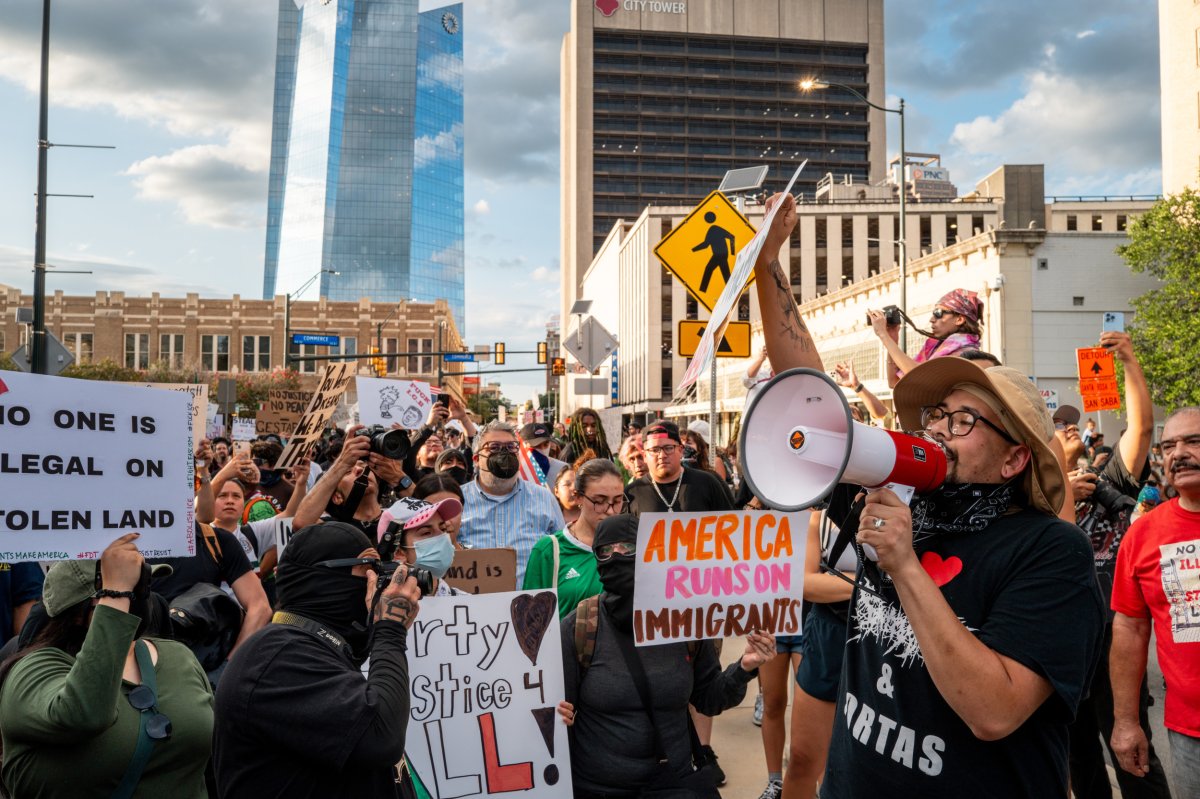
A federal appeals court on Tuesday declined to halt the implementation of a national registry for noncitizens, delivering a procedural victory for the Trump administration in a case that has drawn sharp criticism from immigrant rights advocates.
In a ruling issued in the name of the court as a whole (a “per curiam” order), rather than attributed to a specific judge, a three-judge panel of the U.S. Court of Appeals for the D.C. Circuit rejected an emergency request from several advocacy groups to block the Alien Registration Requirement (ARR) while litigation continued.
Judges Karen Henderson, Robert Wilkins, and Bradley Garcia—appointed by Presidents Ronald Reagan, Barack Obama, and Joe Biden, respectively—found that the plaintiffs had not met the “stringent” standard for an injunction, pending appeal.
Why This Matters
The D.C. Circuit’s refusal to pause the ARR means the rule will remain in effect nationwide for months while the appeal plays out. For the Trump administration, the decision represents a step toward reinstating strict enforcement measures grounded in decades-old immigration laws.
For immigrant rights groups, it signals an uphill legal battle against a policy they say will deter participation in public life and expose millions to heightened surveillance and potential prosecution.
The ruling also underscores that the outcome is not being determined along partisan lines—judges appointed by presidents from both parties agreed the plaintiffs had not met the legal standard for an emergency injunction.

AFP/Getty Images
What To Know
The regulation, which took effect April 11 after a lower court ruling, requires all noncitizens aged 14 and older to register their fingerprints and carry an identification card or face potential fines or imprisonment. Younger children must be registered by a parent or guardian and re-register upon turning 14.
The Department of Homeland Security (DHS) estimates the rule could affect between 2.2 million and 3.2 million people, primarily those who entered the country without documentation.
Canadians staying longer than one month also fall under the requirement.
The panel’s decision on Tuesday leaves in place an April 10 ruling by U.S. District Judge Trevor McFadden, a Trump appointee, who determined that the plaintiffs—Coalition for Humane Immigrant Rights, United Farm Workers of America, Casa Inc. and Make the Road New York—had not demonstrated that the registry would “erode their core missions” and presented only speculative harm.
As the plaintiffs didn’t have the required standing, McFadden concluded the court could not decide the merits of the case.
Broader ‘Self-Deportation’ Strategy
The plaintiffs argue that the policy—which the Trump administration says aligns immigration enforcement with the 1952 Immigration and Nationality Act—is part of a broader “self-deportation” strategy.
Carl Berquist, general counsel for the Coalition for Humane Immigrant Rights, told Courthouse News that the measure “melds into the administration’s entire self-deportation plan of rolling out these [ICE] raids, repurposing the CBP One app into this CBP Home app with a self-deportation tool and trying to roll out some kinds of incentives for people to take action.”
The policy had a “severe chilling effect” on noncitizens, Berquist added, implicating “their Fifth Amendment right not to self-incriminate” and “their First Amendment right to assemble and to protest,” He described the case as “a little bit below the radar” compared with higher-profile immigration disputes but maintained the harm is “substantial nonetheless.”
The National Immigration Law Center has also warned that enforcement could lead to increased racial profiling. In a statement, the group said: “While their stated targets are undocumented immigrants, the very mechanics of enforcing registration expand the target to anyone who looks or sounds foreign to law enforcement.”
Newsweek contacted Carl Berquist and the National Immigration Law Center for comment via email on Thursday outside of regular office hours.
What People Are Saying
DHS Assistant Secretary for Public Affairs Tricia McLaughlin said: “The Trump administration will enforce all our immigration laws—we will not pick and choose which laws we will enforce.” An emailed statement carried by Courthouse News continued: “We must know who is in our country for the safety and security of our homeland and all Americans.”
What Happens Next
According to DHS, certain categories of immigrants—including green card holders, individuals with removal orders, people holding Employment Authorization Documents, those admitted with visas, border crossing card holders, and others—are already considered registered under existing law.
The D.C. Circuit has set an expedited schedule for the case, with the plaintiffs’ brief due September 16, the government’s response due October 16, and a reply from the plaintiffs due November 6.
Oral arguments will follow, with a date to be determined.
For now, the ARR remains in effect nationwide, and both sides are preparing for a legal confrontation in the fall that could test the scope of federal authority over noncitizen identification and tracking.




